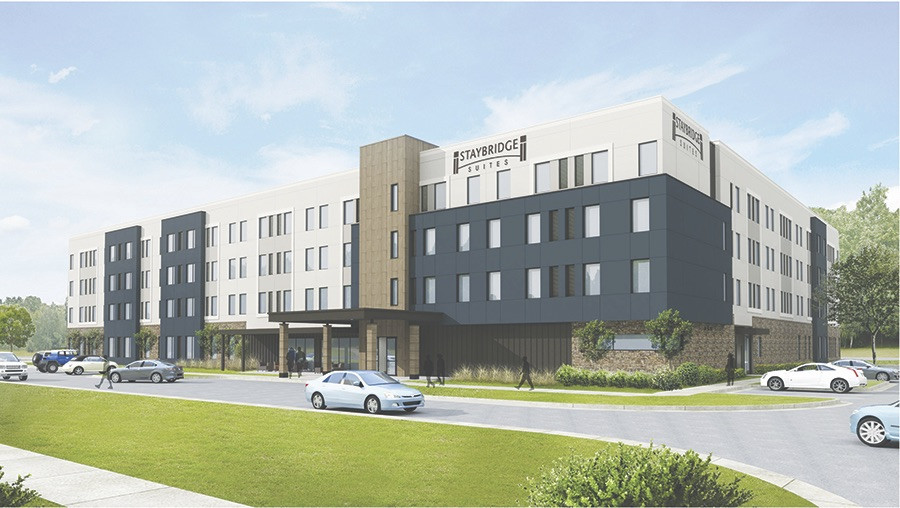Hotel developer presents Alamosa County Commissioners with possible property tax reductions and sales tax revenue estimates

ALAMOSA COUNTY — At the Jan. 24 meeting of the Alamosa Board of County Commissioners, hotel developer Manish Patel provided a handout outlining various property tax reduction proposals for a hotel he is planning on building on the former Walsh Hotel site in downtown Alamosa. The proposed tax reductions range from $200,000 to $ 1 million. The handout and presentation by Patel were not an action item for the board and no action was taken.
In October of last year, by unanimous vote, the city council of Alamosa authorized Heather Sanchez, city manager, to sign a development agreement with Alamosa businessman Manish Patel for the construction of a 90-room downtown hotel to be located on the former site of the Walsh Hotel.
In the document, Patel estimates that the sales tax revenue generated by a 92-room hotel will be $120,000 annually and the property tax generated for the county will be $45,000 annually. Hotel tax generated annually is estimated to be between $240,000 to $300,000 annually.
In the handout provided by Patel titled, New Money Generated by Hotel for Alamosa County, provided to commissioners, "Some of the other projects my partner have finished in Colorado over the past 15 years with some incentives are listed below for your review."
The 120-room Hyatt Place Downtown in Colorado Springs received a $2.3 million incentive from the city to be spread over 10 years.
"Most of the money came from reduced property tax," according to the proposal. A 63-room Holiday Express and Suites in Manitou Springs that opened in 2022 received a $1.3 million incentive from the city and, "most of this money came from reduced property tax. A 63-room Holiday Inn Express and Suites that opened in 2022 received a $1.3 million incentive from the city, also in the form of reduced property taxes.
Patel's document included several proposed hotels that may be built on the old Walsh Hotel site and the amount of incentive from Alamosa County Patel is seeking. For a 90-room Hyatt Place, "We will need to get a total of $1 million incentive to bring this Hotel with Conference Room & Food and Beverage." For a 90-room Springhill Suites, "we will need to get a total of $500,000 incentive to bring this Hotel with Conference Room." Several other hotel possibilities for the downtown site include reduced property tax incentives from Alamosa County in amounts between $200,000-$300,000.
As previously reported in the Valley Courier, a development agreement Patel reached with the City of Alamosa in October 2023 involves three pieces of property already owned by the negotiating parties — specifically, the city-owned 45,000 square-foot lot where the Walsh Hotel once stood and the 18,750 square-foot lot (known locally as the Pink Elephant site) Patel owns that is directly east of the Walsh on the other side of State Avenue.
Further to the east, the Pink Elephant site is bordered by another lot, owned by the city of Alamosa and measuring 11,500 square feet. Combined, the Pink Elephant site and the lot to the east total 30,100 square feet, all unpaved and currently used for parking.
According to the development agreement, the city will deed over the 45,000 square-foot lot to Patel. In exchange, Patel will deed over the Pink Elephant 18,750 square foot lot, giving the city ownership of that entire 30,100 square foot area.
Patel further agrees to construct a parking lot on the 30,100 square foot land with the agreement that some of the parking spaces will be dedicated, as needed, to hotel use from 3:00 p.m. to 9:00 a.m. the next day.
In return, the city agrees to reimburse Patel for the construction of the parking lot from the new sales tax funds paid by the hotel. In that way, Sanchez emphasized, the city is not using any funds from the existing budget to repay Patel but, instead, reimbursing him for the construction from a portion of the sales tax funds generated by the hotel he built.
Depending upon the number of parking spaces required by code, how many of those parking spaces will be located on the hotel property, and how many will be needed on the parking lot across the street, a cap will be set for the amount Patel will be reimbursed for the cost of construction.
In speaking to the council in October, Sanchez acknowledged that the agreement may seem, at first glance, to be inequitable — deeding 45,000 square feet of land to Patel and being deeded 18,750 square feet of land in return.
But, she said, that cost will be offset by the influx of new revenue the downtown hotel will create. Using an algorithm accepted as an industry-standard in calculating the economic impact of a hotel on the surrounding economy, it's anticipated that hotel construction and operation — for example creation of new jobs — will have a direct positive impact of $21.9 million on the city. Once multipliers are applied as those dollars are circulated in the local economy, that projected impact increases to $39.2 million.
In the following years, the direct impact to the local economy is estimated to be $11.9 million with a total estimated impact, each year, of $20.2 million.
As Deacon Aspinwall, planner for the city of Alamosa, later told the Valley Courier at the time, the development agreement also includes deadlines, including a July 2024 deadline for plans to be completed and a July 2027 deadline for the hotel to be ready for occupancy.
When reached by the Valley Courier, Patel said he was unable to comment now and would be able to comment after Feb. 4. Requests from comment Alamosa County Commissioners Laske and Heersink were not returned by press time.



